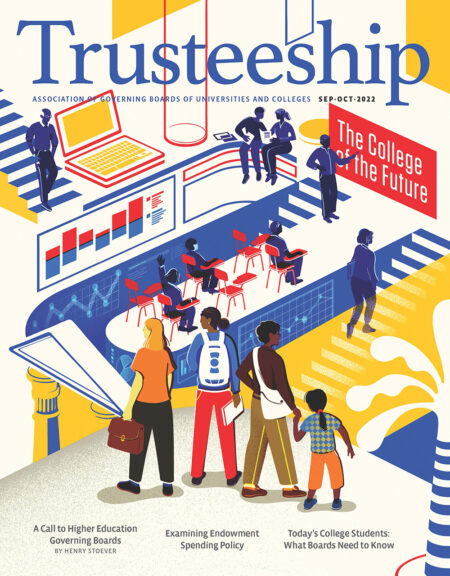
In August of 1976, I took my first steps onto the campus of Southern Methodist University. I walked into a four-story men’s-only dormitory—the only black face in the building. In the shadow of the Civil Rights movement, how does that teenager find his footing? How does he fit in, find community, and thrive in his education?
First, a shout out to my parents. I was blessed with a mother and father who told me frequently that I was great—that there wasn’t anything I couldn’t do—and I believed them. But the educational environment means so much for new college students. It’s one thing to say that you are fostering an inclusive attitude, but it’s quite another to make it real for young people. I believe that student success is largely dependent on environment. The more welcoming you are to students—the more inclusive your campus—the better the chances that students will matriculate and graduate.
Universities have a responsibility to provide opportunities for students to get involved. Whether it’s through organized mixers, social or academic clubs, or even club sports and tailgating (at SMU it’s called “boulevarding”), the opportunity to find community should be table stakes for our institutions. But the students also have their part to play. Just because a university is providing these resources, students will not automatically participate. It’s a two-way street. Yes, the students must feel welcome and safe enough to participate, but they also must take the initiative to engage in what the university has to offer. The college experience is about challenging what you think you know. It’s about seeing things from different perspectives. The more the institution can provide the environment for that engagement, the better off we’ll all be, and the more successful the students will be. I found so much of my success was relationship-based. The stronger my relationships, the better equipped I was to handle SMU.
During my first semester, all the freshmen were grouped together. It didn’t matter what color we were or where we came from, we were all new here and had that in common. We lived together, we took our meals together—a sense of community formed simply from being scared freshmen together. But then the more people you met, the more you’d start to hear about what they were into, and about organizations for those groups. I went to a town hall meeting where the president of the university told us his door was always open, and I felt safe to explore and to grow. I’m in this new environment with all these possibilities. I felt I could succeed.
In many ways, it’s harder now than it was in my day. Students come to campus from all different corners of a severely divided nation of polarized political parties and what can feel like a lack of human decency. Social media let people feel emboldened to say just about anything, without sometimes understanding the consequences of their words. If a fellow student in 1976 wanted to say something ugly to me, they’d have to look me in the eye. Now it can be done in the shadows—anonymous posts making accountability impossible and escape unlikely. There are no truly safe spaces anymore. Universities, of course, can’t regulate that, but they can foster an environment for kindness and civility to shine through.
That freshman experience laid a foundation for me. After that, I felt like I was part of a larger pool. I was more than a freshman, I was an SMU student. Student government became my passion and my community, but it could have been anything. There were communities that formed allegiances and lifelong friendships. That can still happen today. Social media also has the ability to bring us closer than ever before. We just need the right guard rails and attitudes to make the most of it.
I’m very proud that the company I work for not only recognizes the importance of these issues, but we live them through our values. Today’s college students are tomorrow’s business leaders. Which is why AT&T is working closely with AGB to form a first-of-its-kind cross-functional Council for Student Success to help governing boards address systematic challenges to student success through the lens of social justice, equity, and inclusion. We’re bringing together board and committee members, faculty, chief executives, and other education experts to find actionable intelligence and resources designed to increase retention and graduation rates—for all students. The hope is that we’ll be able to enhance the college experience while also better preparing students for what comes next: meaningful employment and professional or graduate school, all with an eye on reducing debt.
What I love most about undergraduate school is that you’re not only learning about your chosen field, you’re learning about yourself. You’re learning how to find community without your family and how to navigate the world on your own, often for the first time. That’s a big deal… and can be hard. If an educational institution can take steps to make that feel in any way easier, what a victory.
David Huntley is AT&T’s chief compliance officer.


